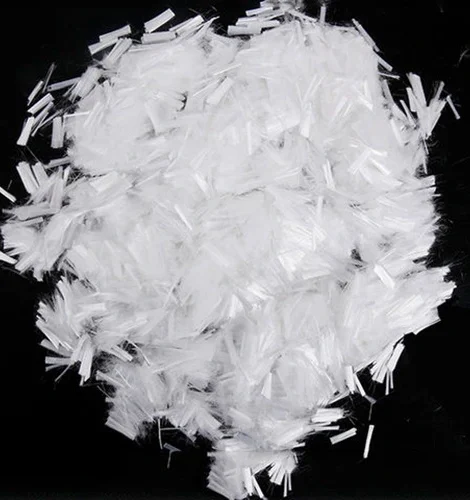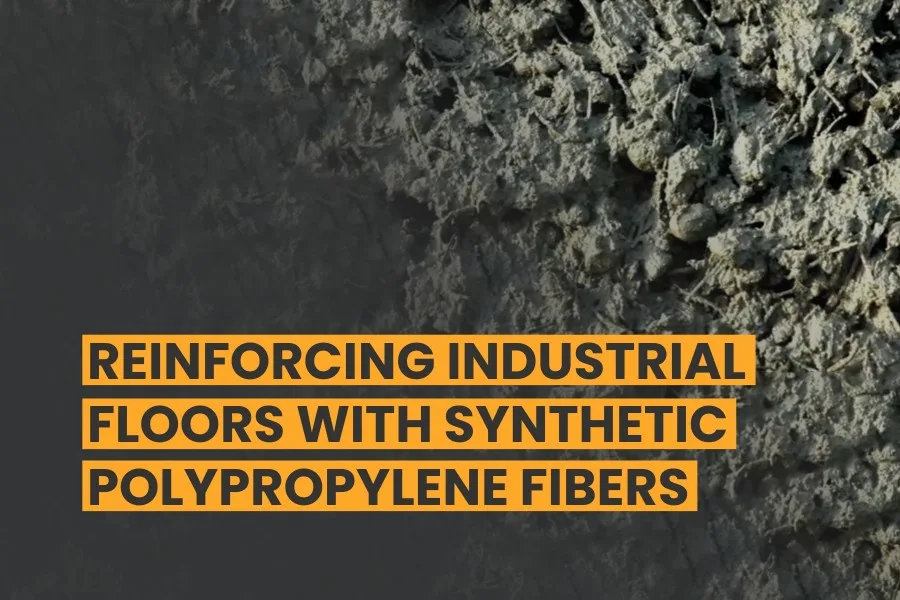The reliability and durability of industrial flooring in high-traffic facilities (manufacturing, warehouses, and distribution centers) are of great importance. Industrial floors receive stress from heavy machinery, moving machinery, and foot traffic all day, every day.
Reinforcing industrial floors is important to ensure durability and functionality. One of the most innovative and effective methods for reinforcing industrial floors with synthetic polypropylene fibers. This modern approach is rapidly gaining popularity as an alternative to traditional steel reinforcement.
Table of Contents
Synthetic Macro Fibers
Synthetic macro fibers are advanced polymer fibers designed specifically to reinforce concrete during the curing process. While microfibers are more effective for addressing surface-level concrete shrinkage cracks, macrofibers provide strength and toughness to the concrete structure as a whole.
In size, these fibers are longer and thicker and provide reinforcement at a level akin to steel mesh, rebar, or steel fibers without many of the downsides.
Due to their structure, synthetic macro fibers greatly increase a floor’s ability to resist cracking, impact, and wear, making them ideal for industrial use.
Specifications of Synthetic Macro Fibers:
Fiber Type: Polypropylene (PP Fibers)
Melting Point: 160°C or higher
Specific Gravity: 0.91
Shape: Irregular cross-section
Anchorage: Continuous embossed
Length: 30-60 mm
Diameter: More than 0.4 mm
Tensile Strength: Over 550 MPa
Young’s Modulus: More than 5 GPa
Corrosion Resistance: Extremely high
Why Use Fibercrete Synthetic Macro Fibers in Industrial Floors?
Better Durability: Industrial floors endure daily pressure from machines, forklifts, foot traffic, etc. PP fibers increase the tensile strength of concrete and make it more resistant to impacts and abrasions. This means fewer repairs and longer life.
Reduced Cracking and Shrinkage: Concrete shrinks as it cures, and some cracks will show up while drying. Macro fibers can help distribute the stress of drying more evenly and reduce the likelihood of cracks from occurring.
Corrosion Resistance: Steel reinforcements will eventually rust, especially in wet or chemically reactive situations. PP fibers do not corrode and are able to hold their structural integrity in extreme situations.
Increased Flexibility and Impact Resistance: Industrial floors are subjected to many different forces, such as rolling pallets or heavy machinery. The added PP fibers will improve the concrete’s ability to flex under pressure, which will improve resistance against chipping or breaking.
Cost Efficiency: Even though the upfront cost may not be different, synthetic macro fibers will save you money in the long run. They will save you time at installation (faster), require less maintenance, and eliminate repairs.
Easier Installation: When you do not need to worry about steel mesh or bars, installation is faster and easier, which reduces labor costs and project delays.
Lightweight and Ease of Use: Unlike steel, the fibers are lightweight and very easy to carry.
Better Durability: Industrial floors endure daily pressure from machines, forklifts, foot traffic, etc. PP fibers increase the tensile strength of concrete and make it more resistant to impacts and abrasions. This means fewer repairs and longer life.
Reduced Cracking and Shrinkage: Concrete shrinks as it cures, and some cracks will show up while drying. Macro fibers can help distribute the stress of drying more evenly and reduce the likelihood of cracks from occurring.

Corrosion Resistance: Steel reinforcements will eventually rust, especially in wet or chemically reactive situations. PP fibers do not corrode and are able to hold their structural integrity in extreme situations.
Increased Flexibility and Impact Resistance: Industrial floors are subjected to many different forces, such as rolling pallets or heavy machinery. The added PP fibers will improve the concrete’s ability to flex under pressure, which will improve resistance against chipping or breaking.
Cost Efficiency: Even though the upfront cost may not be different, synthetic macro fibers will save you money in the long run. They will save you time at installation (faster), require less maintenance, and eliminate repairs.
Easier Installation: When you do not need to worry about steel mesh or bars, installation is faster and easier, which reduces labor costs and project delays.
Lightweight and Ease of Use: Unlike steel, the fibers are lightweight and very easy to carry. When they are mixed into concrete, they blend in well and are compact enough to store on any job site.
Green: PP fibers are supportive of green construction. Their use reduces the quantity of mined steel we use, reduces CO2 emissions, and helps to make floors last longer, which lowers overall impact.
Where can these fibers be used?
Warehouses and Distribution Centres: Warehouses and Distribution Centres experience high traffic from forklifts and heavy loads from pallets. Synthetic macro fibers provide the necessary performance and durability required to support this demand.
Manufacturing Units: Manufacturing units’ floors are continually stressed by vibrations and dynamic forces from their equipment. Macro fibers will work to keep floors standing up against such mechanical stress over time.
Cold Storage: Applications exposed to extreme temperatures, such as cold storage, PP fibers protect against thermal cracking of the concrete.
Parking & Loading: Once again, these heavy-use spaces benefit from the durability of the flooring and resistance from the weight of vehicles and repeated use, to cracking.
How PP Fibers Shape Floors?
PP fibers, along with other synthetic macro fibers, have changed the approach to designing industrial floors. They can combine to create slabs which are tough, flexible, and resistant to damage, giving these floors the performance needed in spaces that serve us all day, every day.
Designers and engineers made it a priority to tackle ground-supported slabs that last longer and require less upkeep. Their capacity to distribute loads evenly, minimize stress concentrations, and keep concrete together even in tough situations is where their strength comes from.
As industries are adopting smarter, more efficient means of building, PP fibres are a simple but powerful way to allow buildings to better harness all the building components for a safer, easier, and inexpensive method of doing things.
From improved safety to lower costs, PP fibres are being accepted within industries for the viability of their benefits.

About Sakshi Chem Sciences Pvt. Ltd.
Sakshi Chem Sciences Pvt. Ltd. is a well-known name in the construction chemical segment, based in Nagpur, India. The company, which is privately held, has built a reputation on the back of its quality and affordable construction chemical products since it commenced manufacturing in 2004.
The company produces many chemical solutions before and after the construction phase. All their products are developed and designed to perform reliably and are environmentally responsible. Sakshi Chem Sciences’s products include, among many others, concrete admixtures, waterproofing chemicals, and a variety of specialty additives that will optimize concrete.
Sakshi Chem Sciences is India’s only and largest manufacturer of Redispersible Polymer Powder (RDP). As such, they offer their customers solutions that are setting the limits on new building materials.
Sakshi Chem Sciences, a committed partner to many infrastructure developers around the world, has a mission to change the construction industry with strong, effective, efficient, and innovative solutions.
Conclusion
Reinforcing industrial floors with synthetic polypropylene fibers is not simply a trend; it is a wise long-term investment.
Synthetic macro fibers like polypropylene (PP) fibers are indelibly strong, allow straightforward installation, are pliancy and stable under load, are resistant to deterioration and cracking, while also resisting extreme weather conditions.
There are further advantages for fibers, including crack resistance and the reduced environmental impact relative to concrete or steel. Synthetic Macro-fibers are paving the way for the next iteration of industrial flooring.
As construction sites become more complex it is important to utilize the correct types of reinforcement that will make a difference. Synthetic macro-fibers are paving the way for the future of industrial flooring.
Sagar Telrandhe is a Construction Engineer with a B.Tech in Construction Engineering & Management. Passionate about infrastructure development, project planning, and sustainable construction, he specializes in modern construction techniques, project execution, and quality management, contributing to efficient and innovative building.


